3 Oceania
The Pacific Island countries are Japan’s “neighbors” bound by the Pacific Ocean and also share deep historical ties with Japan. In addition, in possessing vast Exclusive Economic Zones (EEZ), Note 10 these countries are key to maritime transport activities and provide essential fishing grounds for bonito and tuna fisheries.
Many Pacific Island countries are relatively new independent states with the urgent task of becoming economically independent. In addition, they face common challenges particular to small island countries, such as small-scale economies dependent on specific industries, geographically extended territories over a vast area of the sea, difficulty in accessing international markets, and vulnerability to natural hazards.
● Japan’s Efforts
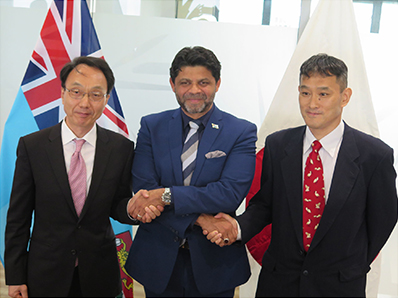
Mr. Kawakami, Ambassador of Japan to Fiji (left), Mr. Sayed-Khaiyum, Acting Prime Minister, Attorney-General and Minister for Economy, Civil Service and Communications, Housing and Community Development of the Republic of Fiji (center), and Dr. Suzuki, Deputy Resident Representative of JICA Fiji Office (right) shaking hands at the loan agreement signing ceremony for the COVID-19 Crisis Response Emergency Support Loan (Phase 2) (February 22, 2022) (Photo: JICA)
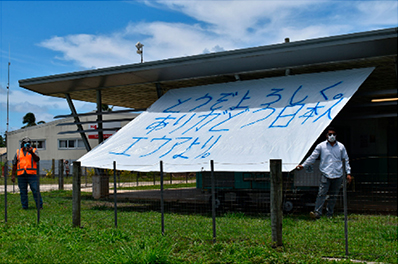
Japan dispatched the Japan Disaster Relief (JDR) Team Self-Defense Force (SDF) Unit to Tonga, which was hit by a volcanic eruption and a tsunami. The residents of Tonga holding a banner showing “thank you” in Japanese at an airport to welcome the landing of the CH-47 of the Japan Ground Self-Defense Force transporting fresh water made in the JS Osumi, a Japan Maritime Self-Defense Force vessel. (Photo: Ministry of Defense)
In order for Pacific Island countries to achieve political stability and self-reliant economic development, it is crucial not only to support each country in overcoming their socio-economic vulnerabilities, but also to provide comprehensive assistance for the entire region. Japan promotes cooperation with the Pacific Islands Forum (PIF), Note 11 a framework for regional cooperation composed of Pacific Island countries, and has hosted the Pacific Islands Leaders Meeting (PALM), a summit meeting between Japan and Pacific Island countries every three years since 1997. Note 12
In June 2021, prior to the 9th Pacific Islands Leaders Meeting (PALM9), a meeting of the Interagency Committee for Promoting Cooperation with Pacific Island Countries was held and a policy to strengthen all-Japan efforts for Pacific Island countries was compiled. At PALM9 held in July, the “Joint Action Plan for Strengthening Pacific Bonds and for Mutual Prosperity” was adopted as an annexed document to the Leaders Declaration. In response to the Joint Action Plan, Japan provides assistance to Pacific Island countries for the next three years from 2021, focusing on the following five priority areas: (i) COVID-19 Response and Recovery, (ii) Sustainable Oceans based on the Rule of Law, (iii) Climate Change and Disaster Resilience, (iv) Strengthening the Foundation for Sustainable and Resilient Economic Development, and (v) People-to-People Exchanges and Human Resource Development (see “Project Introduction Column” for cases of support to the Pacific Island countries region).
In response to the spread of COVID-19, in February 2022, Japan additionally provided approximately 7,000 doses of vaccines manufactured in Japan to Tonga through the COVAX Facility, Note 13 with which the total doses of vaccines Japan has provided to the Oceania region reached 330,000. Furthermore, throughout the Pacific Island countries region, by the end of 2022, Japan contributed to the strengthening of health and medical systems by providing health and medical equipment, developing cold chains Note 14 to deliver vaccines to vaccination sites, and securing medical personnel to administer the vaccinations. In addition, to support economic recovery, Japan has provided COVID-19 Crisis Response Emergency Support Loans totaling 52.5 billion yen to Fiji, Papua New Guinea, and Solomon Islands. Japan also provides support for strengthening the border control capacity of the region with measures against infectious diseases toward the upcoming resumption of economic activities after the COVID-19 pandemic.
Moreover, to Tonga, which was affected by the volcanic eruption and tsunami that occurred on January 15, 2022, Japan provided emergency relief goods through JICA and also dispatched the Japan Disaster Relief (JDR) Team Self-Defense Force (SDF) Unit to transport the goods. In addition, as reconstruction assistance, Japan provided waste disposal-related equipment and water infrastructure maintenance equipment to Tonga. Japan also made a decision to raise the maximum grant amount to provide a wireless nationwide early warning system for disasters and to provide broadcasting devices and facilities of the Tonga Broadcasting Commission (see also “Project Introduction Column” for Japan’s assistance to Tonga).
Japan will continue to support Pacific Island countries in strengthening health and medical systems, recovering the economies impacted by COVID-19, and providing assistance for emergencies, including for disasters, in collaboration with the United States, Australia, New Zealand, and other partners. Through such efforts, Japan will work hand in hand with the region in building a resilient, stable, and prosperous Pacific Island countries region toward the post-COVID-19 era.
Tonga
Protecting Lives through Disaster Communication
Project for Nationwide Early Warning System and Strengthening Disaster Communications
Grant Aid (June 2018 - April 2023)
Tonga, an island country in the South Pacific, consists of four archipelagos of over 170 large and small islands. The country is prone to natural disasters such as cyclones, earthquakes, and tsunamis, and it is ranked as the third most vulnerable country in the world to natural disasters.Note 1 Despite this situation, the necessary equipment for communicating disaster information to residents was not in place, causing delays in evacuating residents.
Against this backdrop, Japan started to develop an early warning system connecting the Tonga mainland and remote islands, as well as facilities and equipment for the Tonga Broadcasting Commission. However, the project was delayed due to the impact of COVID-19, and furthermore, a volcanic eruption and tsunami occurred in January 2022 before the system and equipment were fully installed with Japan’s assistance. Domestic and international telephone and internet communications were cut off, which made it difficult to assess the situation on remote islands, confirm safety, and communicate disaster information. If the early warning system that was planned to be developed under this project had been completed, it would have been possible to quickly communicate disaster warning and safety information nationwide. It was regrettable that the system was incomplete at the time of the eruption and tsunami, and the Government of Tonga and the citizens expressed their earnest desire for its early completion.
Approximately two months after, Japanese engineers returned to the project site to restore damaged facilities and equipment and installed the remaining equipment. At the opening ceremony in September 2022, His Royal Highness Crown Prince Tupouto‘a ‘Ulukalala said, “Our calling is preparing ourselves to prevent casualties of natural disasters. We can save those who might be affected in the future by using this early warning system,” indicating his strong recognition of the importance of this system in Tonga.
Through this project, the arrival time of tsunami warning to residents was reduced from a maximum of 90 minutes to less than 8 minutes, and the siren sounds can now reach all residents in tsunami hazard areas.
The Ninth Pacific Islands Leaders Meeting (PALM9), one purpose of which is to strengthen the partnership between Japan and Pacific Island countries, lists “climate change and disaster resilience” as one of the priority areas for Japan to cope with Pacific Island countries over the next three years. Japan will continue to cooperate with Pacific Island countries, which are vulnerable to natural disasters, by utilizing Japan’s knowledge of disaster prevention.
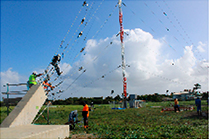
Construction of an antenna for an AM radio broadcasting system that enables information communication to the Niuas Islands, approximately 600 km from the capital (Photo: JICA)
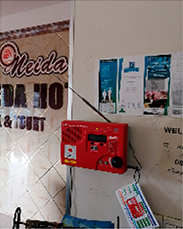
Remote Activated Receiver (RAR). An “indoor siren terminal” installed to expand and complement the range of siren alarms at approximately 500 locations nationwide. (Photo: The Consortium of Yachiyo Engineering Co., Ltd., Japan Telecommunications Engineering and Consulting Service, and Kokusai Kogyo Co., Ltd.)
Note 1: Based on the Global Risks Report 2021.
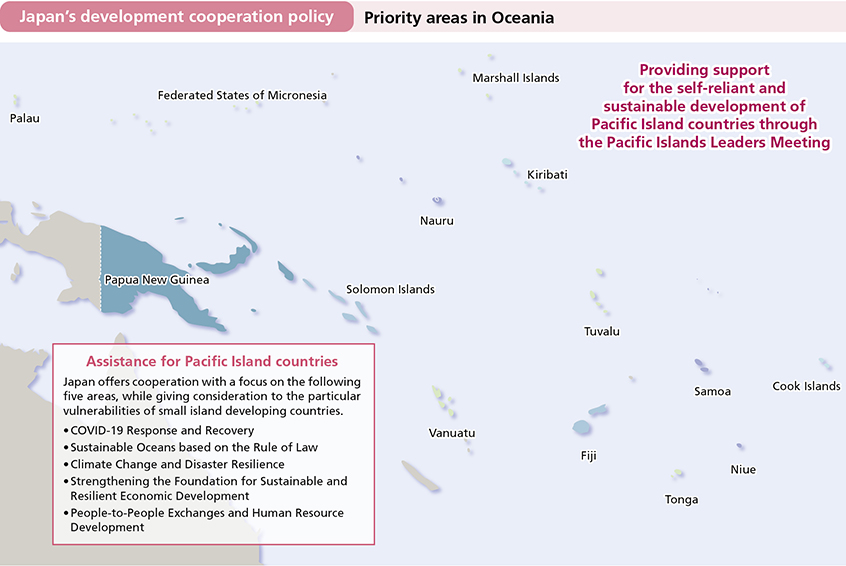
- Note 10: Maritime zones where a sovereign country has certain economic rights that can be established outside its territorial waters.
- Note 11: As of December 2022, the 15 PIF member countries and 2 member regions are Australia, New Zealand, Papua New Guinea, Fiji, Samoa, Solomon Islands, Vanuatu, Tonga, Nauru, Tuvalu, Federated States of Micronesia, Marshall Islands, Palau, Cook Islands, Niue, French Polynesia, and New Caledonia (Kiribati withdrew from PIF).
- Note 12: The PALM Ministerial Interim Meeting has been held approximately 18 months after each PALM with foreign ministers serving as co-chairs since 2010.
- Note 13: See the glossary.
- Note 14: See Note 54.
